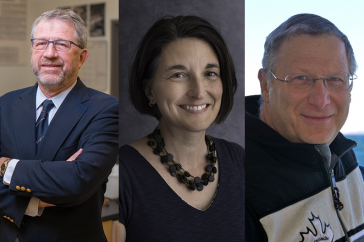UNH Professors Receive Prestigious Honors For Earth Science Research

L to R: William McDowell, Serita Frey and Larry Mayer. Credit: UNH
DURHAM, N.H.— Three faculty members at the University of New Hampshire are being recognized for their body of work and have been chosen as this year’s fellows for two internationally respected science organizations. William McDowell, environmental science professor, and Larry Mayer, director of the Center for Coastal and Ocean Mapping, have both been named 2020 fellows of the American Geophysical Union (AGU). Serita Frey, natural resources and environment professor, has been named a fellow of the American Association for the Advancement of Science (AAAS).
"We are proud and excited for all three of our researchers to receive such well-deserved recognition,” said Marian McCord, senior vice provost for research, economic engagement and outreach. “Just a small percentage of researchers are selected as fellows each year and to have three scientists chosen from one university highlights UNH’s strength as an international leader in environmental science research.”
McDowell was selected by the AGU Union Fellows Committee because of his contribution to advancing the field of geoscience through his research that focuses on understanding the role of small streams in global carbon and nitrogen cycles. His long-term studies, which span the globe from the Lamprey River watershed in New Hampshire to the Luquillo Experimental Forest in Puerto Rico, describe the effects of major droughts, rainstorms, urbanization and hurricanes on stream chemistry.
Mayer, a pioneer in ocean mapping, was also honored as an AGU Fellow for his exceptional dedication and research focused on mapping the Earth’s ocean floor. Even though the world’s oceans are widely traveled, fished and explored, experts say only roughly 19 percent of the Earth’s seafloor has been mapped with high-resolution imaging. Mayer is part of the international consortium known as Seabed 2030, which hopes to accomplish that goal by the year 2030. He has participated in more than 90 scientific cruises, including eight in the Arctic, and has shared his expertise with international panels, including President Barack Obama’s Arctic Research Commission.
Frey has been selected as a AAAS Fellow. She is being recognized for her distinguished contributions to microbial and ecosystem ecology, particularly the effect of anthropogenic stressors, or human activities like deforestation and urbanization, on soil microbial communities and microbial-mediated carbon and nitrogen cycles. The honor of being elected a fellow of AAAS is bestowed upon members by their peers.
This year all 62 AGU Fellows will be recognized during a virtual ceremony on December 9, 2020 at 6 p.m. ET. The 489 AAAS Fellows will be inducted during a virtual ceremony to be held on February 13, 2021.
AAAS is the world’s largest general scientific society and publisher of cutting-edge research through its Science family of journals. AAAS was founded in 1848 and includes more than 250 affiliated societies and academies of science, serving 10 million individuals. The nonprofit AAAS is open to all and fulfills its mission to “advance science and serve society” through initiatives in science policy, international programs, science education, public engagement, and more.
AGU is the largest single organization dedicated to the advancement of geophysics. It supports 130,000 enthusiasts to experts worldwide in Earth and space sciences. Through broad and inclusive partnerships, AGU aims to advance discovery and solution science that accelerate knowledge and create solutions that are ethical, unbiased and respectful of communities and their values.
The University of New Hampshire inspires innovation and transforms lives in our state, nation, and world. More than 16,000 students from all 50 states and 71 countries engage with an award-winning faculty in top-ranked programs in business, engineering, law, health and human services, liberal arts and the sciences across more than 200 programs of study. As one of the nation’s highest-performing research universities, UNH partners with NASA, NOAA, NSF and NIH, and receives more than $110 million in competitive external funding every year to further explore and define the frontiers of land, sea and space.
PHOTOS AVAILABLE FOR DOWNLOAD
https://www.unh.edu/unhtoday/sites/default/files/media/bill_mcdowell-118.jpg
William McDowell, professor of environmental science at the University of New Hampshire, was named a fellow of the American Geophysical Union (AGU).
Credit: UNH
https://unh.edu/unhtoday/sites/default/files/media/frey_headshot.jpg
Serita Frey, natural resources and environment professor at the University of New Hampshire, was named a fellow of the American Association for the Advancement of Science (AAAS).
Credit: UNH
https://unh.edu/unhtoday/sites/default/files/media/larry_mayer_can_see_russia_from_here_diomedes.jpg
Larry Mayer, director of Center for Coastal and Ocean Mapping at the University of New Hampshire, was named a fellow of the American Geophysical Union (AGU).
Credit: UNH
Latest News
-
January 12, 2026
-
December 4, 2025
-
November 26, 2025
-
November 6, 2025
-
November 5, 2025













































